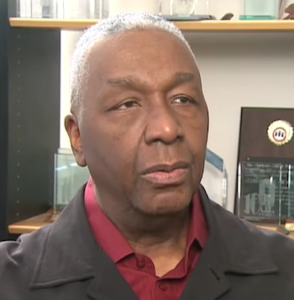
John Thompson Jr.
*John Thompson was born on this date in 1941. He was a Black basketball player and a men's college basketball coach.
John Robert Thompson Jr. was born and raised in Washington, D.C. As a child, his mother insisted on sending him to Catholic schools for educational opportunities and academic challenges. At Archbishop Carroll High School, Thompson emerged as a standout basketball center, playing in three consecutive City Championship games (1958–60).
After graduating from Archbishop Carroll, Thompson attended Providence College, where he played on the 1963 NIT Championship team. In his senior year in 1964, he was part of the first Providence NCAA tournament team and received an honorable mention from the Associated Press for its All-American team.
He was drafted in the third round in 1964 and played two seasons in the National Basketball Association (NBA) for the Boston Celtics from 1964 to 1966, backing up Bill Russell, the Celtics' star center, en route to two championships. Before retiring as a player in 1966, Thompson was selected by the Chicago Bulls in that year's expansion draft. Thompson was the head coach at St. Anthony High School in Washington, D.C., from 1966 to 1972, racking up a 122–28 record. After coaching at St. Anthony, Thompson was hired as the head coach of the men's basketball team at Georgetown University, where he spent the remainder of his Hall of Fame career.
Thompson, an imposing figure on the sidelines, was often noted for the trademark white towel he carried on his shoulder during the games. Inheriting a Georgetown team that had been 3–23 the year before, Thompson quickly and dramatically improved the team, making the NCAA tournament within three seasons. Over the following 27 years in college basketball, Thompson's Hoyas went 596–239 (.714), running off a streak of 24 postseason appearances, 20 in the NCAA tournament, and 4 in the NIT – including a 14-year streak of NCAA appearances from 1979–1992 that saw three Final Four appearances in 1982, 1984 and 1985, winning a national championship in 1984 and narrowly missing a repeat the next year by losing to underdog Villanova.
He won seven Coach of the Year awards: Big East (1980, 1987, 1992), United States Basketball Writers Association and The Sporting News (1984), National Association of Basketball Coaches (1985), and United Press International (1987). Thompson coached many notable players, including Patrick Ewing, Eric ‘Sleepy’ Floyd, Alonzo Mourning, Dikembe Mutombo, and Allen Iverson. Under Thompson, 26 players were chosen in the NBA Draft, including eight in the first round, with two selected first overall: Ewing and Iverson.
Thompson was supposed to be on American Airlines Flight 77 on September 11, 2001; the flight deliberately crashed into the Pentagon in Arlington County, Virginia, near Washington, DC, killing all 64 people on board. His place on the flight was canceled. Ten years later, he would reunite with the booker who removed him from that flight on The Jim Rome Show. After retiring from coaching, Thompson remained active in basketball as a commentator for professional and collegiate games. He hosted The John Thompson Show, a sports talk show on ESPN 980 in Washington, D.C., until February 2012. He is perhaps best remembered as a commentator for having begun interviews with the statement, "Let me ask you a question.” Thompson left ESPN 980 in March 2012 to pursue other broadcasting opportunities. He continued to spend much time around the Georgetown basketball program, including traveling to road games and participating in press conferences.
The Hall of Fame coach led Georgetown to consecutive postseason appearances while maintaining a player graduation rate of 97%. John Thompson died on August 31, 2020, at the age of 78.